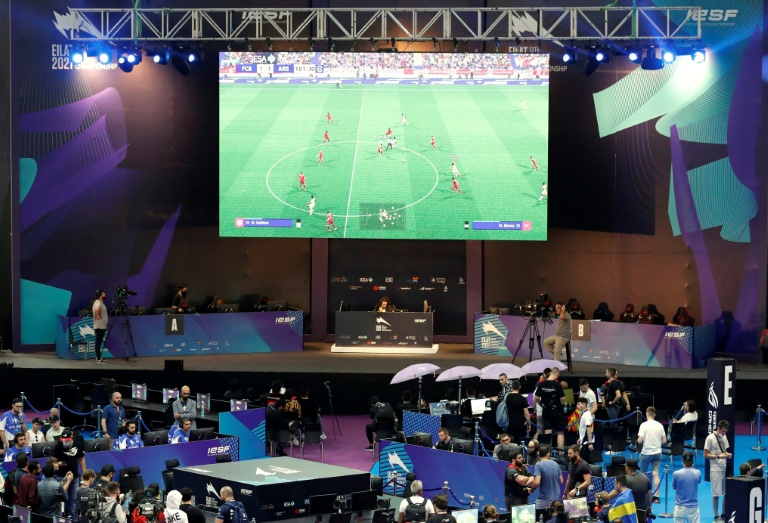Science
China Aims for eSports Football Glory with New National Team

China is making a significant push into the world of football eSports, driven by a national desire for success on the digital pitch. The Chinese Football Association (CFA) recently announced plans to establish its own national eSports football team. This development has sparked excitement among players like Zhao Yitang, who experienced competitive play this summer. Zhao, a recent graduate, competed in the “eFootball” championship held in Tokyo, where he finished in second place, marking China’s best international result in the game, formerly known as Pro Evolution Soccer.
The CFA’s initiative aims to create a competitive team for eSports events organized by FIFA and the Asian Football Confederation. Zhao expressed his enthusiasm, stating, “If I could join the national team I would go all-out in my efforts for the side.” With eSports gaining immense popularity globally, China is keen to capitalize on this trend as it continues to grapple with challenges in traditional football.
Challenges in Real-Life Football
Despite the fervent support for football in China, the country’s national team has struggled for decades. As of now, the men’s team ranks 93rd in FIFA’s global standings and has failed to qualify for the upcoming 2026 World Cup. The CFA’s efforts in eSports could provide a new avenue for national pride and achievement, particularly as the gaming sector thrives in the country.
China represents one of the largest gaming markets in the world, but the financial incentives for football eSports players remain modest compared to other eSports titles. Unlike popular titles such as League of Legends or Dota 2, where top players can earn substantial salaries, football eSports lacks the same level of financial backing. A leading player in the field, who requested anonymity as Monaco, highlighted the challenges, noting that even the most successful players can earn only around 70,000 RMB (approximately $9,800) annually before taxes, making it difficult to pursue a full-time career in this niche.
Investing in the Future of eSports
Despite the obstacles, some clubs are actively investing in eSports. Changchun Yatai, a team in the Chinese Super League, stands out as one of the few clubs dedicated to establishing a presence in the eSports sector. Manager Pan Shuyin remarked, “We are the only football club in the whole Chinese Super League, maybe even the only football club in China, continuously investing in eSports.” This commitment aims to attract younger fans while navigating the challenging financial landscape of eSports.
While Chinese teams have participated in international football eSports tournaments in the past, they currently do not appear on the roster for the forthcoming FIFAe World Cup, scheduled for December in Saudi Arabia. This gap underscores the need for investment and development within the eSports football community.
Zhao, also known as “Ding” or “Teacher Ding” within the eSports community, discovered football video games in 2018 as a way to unwind from his academic and athletic commitments. He emphasized that a solid understanding of real-life football is essential to excel in eSports, stating, “If you watch a lot of real-life football matches, or play a lot of real-life football, you will have your own understanding of how to succeed in eSports.”
As the CFA prepares to launch its national eSports team, the future of football in China—both on the pitch and in the digital realm—remains to be seen. With the right investments and support, eSports could provide a new chapter for a nation eager to achieve football glory at last.
-

 Education3 months ago
Education3 months agoBrandon University’s Failed $5 Million Project Sparks Oversight Review
-

 Science4 months ago
Science4 months agoMicrosoft Confirms U.S. Law Overrules Canadian Data Sovereignty
-

 Lifestyle3 months ago
Lifestyle3 months agoWinnipeg Celebrates Culinary Creativity During Le Burger Week 2025
-

 Health4 months ago
Health4 months agoMontreal’s Groupe Marcelle Leads Canadian Cosmetic Industry Growth
-

 Science4 months ago
Science4 months agoTech Innovator Amandipp Singh Transforms Hiring for Disabled
-

 Technology4 months ago
Technology4 months agoDragon Ball: Sparking! Zero Launching on Switch and Switch 2 This November
-

 Education4 months ago
Education4 months agoRed River College Launches New Programs to Address Industry Needs
-

 Technology4 months ago
Technology4 months agoGoogle Pixel 10 Pro Fold Specs Unveiled Ahead of Launch
-

 Business3 months ago
Business3 months agoRocket Lab Reports Strong Q2 2025 Revenue Growth and Future Plans
-

 Technology2 months ago
Technology2 months agoDiscord Faces Serious Security Breach Affecting Millions
-

 Education4 months ago
Education4 months agoAlberta Teachers’ Strike: Potential Impacts on Students and Families
-

 Education3 months ago
Education3 months agoNew SĆIȺNEW̱ SṮEȽIṮḴEȽ Elementary Opens in Langford for 2025/2026 Year
-

 Science4 months ago
Science4 months agoChina’s Wukong Spacesuit Sets New Standard for AI in Space
-

 Business4 months ago
Business4 months agoBNA Brewing to Open New Bowling Alley in Downtown Penticton
-

 Business4 months ago
Business4 months agoNew Estimates Reveal ChatGPT-5 Energy Use Could Soar
-

 Technology4 months ago
Technology4 months agoWorld of Warcraft Players Buzz Over 19-Quest Bee Challenge
-

 Business4 months ago
Business4 months agoDawson City Residents Rally Around Buy Canadian Movement
-

 Technology4 months ago
Technology4 months agoFuture Entertainment Launches DDoD with Gameplay Trailer Showcase
-

 Technology2 months ago
Technology2 months agoHuawei MatePad 12X Redefines Tablet Experience for Professionals
-

 Top Stories3 months ago
Top Stories3 months agoBlue Jays Shift José Berríos to Bullpen Ahead of Playoffs
-

 Technology4 months ago
Technology4 months agoGlobal Launch of Ragnarok M: Classic Set for September 3, 2025
-

 Technology4 months ago
Technology4 months agoInnovative 140W GaN Travel Adapter Combines Power and Convenience
-

 Science4 months ago
Science4 months agoXi Labs Innovates with New AI Operating System Set for 2025 Launch
-

 Technology4 months ago
Technology4 months agoNew IDR01 Smart Ring Offers Advanced Sports Tracking for $169










